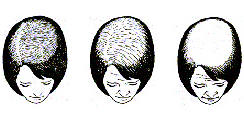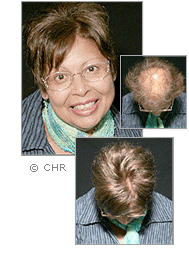Understanding Hair Loss – Frequently Asked Questions
Understanding the cause of hair loss may better indicate exactly why it presently has no cure. The most common cause of hair loss in men and women, is male and female pattern baldness, also known as Androgenetic Alopecia.
Common Causes of Hair Loss:
- Alopecia areata: Generally thought to be an autoimmune disorder. Causes “patchy” hair loss, often in small circular areas in different areas of the scalp.
- Alopecia totalis: Total hair loss of the scalp, (an advanced form of alopecia areata).
- Trichotillomania (TTM), or “trich” as it is commonly known, is an impulse control disorder characterized by the repeated urge to pull out scalp hair, eyelashes, facial hair, nose hair, eyebrows or other body hair, often resulting in noticeable bald patches.
- Chemotherapy: One of the most common side effects of chemotherapy treatment is hair loss. Chemotherapy hair loss may occur on the scalp, face, underarms, and other places on the body.
Non-Surgical Hair Restoration FAQ
Q: My hair is thinning and I don’t want surgery. What can I do?
A: There are several non-surgical options available to you at Creative Hair Replacement in Tupelo.
Q: I’m a very active person. Can I still participate in sports?
A: Yes, the purpose of Creative Hair Replacement’s procedures is to allow you to do the things that you stopped doing because of your hair loss, such as swimming, boating, water skiing and even riding your Harley.
Q: Are there any limitations on the hair style I choose, or how I can comb my hair?
A: You can comb your hair anyway you want, even straight back.
Q. What about hair extensions
A: Hair extensions are a great way to add length and fullness to your hair. However if you have very fine or thinning hair, they may not be an appropriate answer for women with thinning hair and hair loss. A private evaluation by a trained hair loss specialist can help you decide if hair extensions may be right for you.
Thinning Hair in Women – Female Hair Loss
The most common type of hair loss women face is androgenetic alopecia, also known as female pattern alopecia or baldness. This is seen as hair thinning predominantly over the top and sides of the head. It affects approximately one-third of all susceptible women, but is most commonly seen after menopause, although it may begin as early as puberty. Normal hair shedding is approximately 100-125 hairs per day. Fortunately, these hairs are replaced. True hair loss occurs when lost hairs are not regrown or when the daily hair shed exceeds 125 hairs. Genetically, hair loss can come from either parent’s side of the family.
 There are two different types of hair loss, medically known as Anagen Effluvium and Telogen Effluvium. Anagen Effluvium is generally due to internally administered medications, such as chemotherapy agents, that poison the growing hair follicle. Telogen Effluvium, is due to an increased number of hair follicles entering the resting stage.
There are two different types of hair loss, medically known as Anagen Effluvium and Telogen Effluvium. Anagen Effluvium is generally due to internally administered medications, such as chemotherapy agents, that poison the growing hair follicle. Telogen Effluvium, is due to an increased number of hair follicles entering the resting stage.
The most common causes of Telogen Effluvium are:
- Physical stress: surgery, illness, anemia, rapid weight change
- Emotional stress: mental illness, death of a family member
- Thyroid abnormalities
- Medications: High doses of Vitamin A, Blood pressure and Gout medications
- Hormonal causes: pregnancy, birth control pills, menopause
When the above causes of Telogen Effluvium are reversed or altered you should see the return of normal hair growth.
 Myths Related to Hair Loss
Myths Related to Hair Loss- Frequent shampooing contributes to hair loss
- Hats and wigs cause hair loss
- 100 strokes of the hair brush daily will create healthier hairPermanent hair loss is caused by perms, colors and other cosmetic treatments
- Women are expected to develop significant hair loss if they are healthy
- Shaving one’s head will cause the hair to grow back thicker
- Standing on one’s head will cause increased circulation and thereby stimulate hair growth
- Dandruff causes permanent hair loss
- There are cosmetic products that will cause the hair to grow thicker and faster
- Stress causes permanent hair loss
- Hair loss does not occur in the late teens or early twenties
- Hair loss affects only intellectuals
- There is a cure for Androgenetic Alopecia
Say Goodbye to Hair Loss Anxiety
Whether you are experiencing thinning hair and want to stop your hair loss, or want more hair, we offer the latest clinically proven hair loss treatment and hair restoration solutions for men and women of all ages and hair types.
We want to help you find the hair loss solution that is right for you. Fill out our form to get started with your free, private consultation.
Free, Private Consultation
Restore your hair. Restore your life. Book Online Now.


